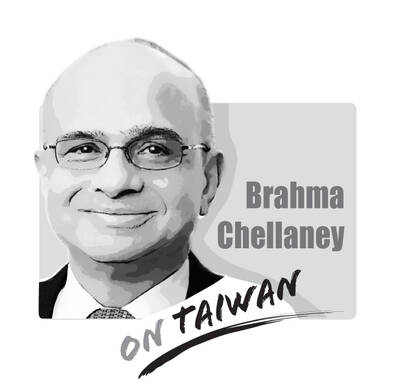Ma Ying-jeou (馬英九) was elected as the next president of Taiwan with the campaign slogan “Taiwan moves forward.” However, by visiting and paying his respects to the late dictator Chiang Kai-shek (蔣介石) he is retreating into the past.
If the Chinese Nationalist Party (KMT) is a modern party that represents Taiwan and has a vision for the future, it would distance itself from Chiang. Instead it is displaying its true colors as a party of the past that suffers badly from historical amnesia.
Ma would be much better spending his time paying respect to the victims of the White Terror and making efforts of achieve transitional justice.
Taiwan needs to move forward in a spirit of harmony and reconciliation.
The president-elect should set a better example.
David Reid
Xindian
The proposal that Ma visit the US before his inauguration next month is a great idea that should serve the best interests of the US, China and Taiwan in the long run.
After reading Sushil Seth’s article (“Can Ma work cross-strait miracles?” page 8, March 28) and Li Chen-ching’s letter (Letters, page 8, March 29), I think that there are many considerations for the US to realistically endorse the request.
First, the US should realize that the most suitable time for Ma to visit Washington would be before his inauguration, good timing that will help warm up cross-strait relations.
US President George W. Bush has stressed that it is a fresh opportunity for China and Taiwan to solve long-term tensions.
He has also reiterated that a peaceful relationship between Taiwan and China will be beneficial to multilateral interest. A visit by Ma to the US before May 20 is a practical option for enhancing multilateral relations.
As China is busy coping with the hectic problems of Tibet and simultaneously bracing for the Olympic Games in August, endorsing Ma’s unofficial visit to the US before his inauguration is a pragmatic and acceptable arrangement, signifying harmony and cooperation for all in the years to come.
Debbie Hou
Taipei
Taiwan’s victory in the World Baseball Softball Confederation Premier12 championship is an historic achievement. Yet once again this achievement is marred by the indignity of the imposed moniker “Chinese Taipei.” The absurdity is compounded by the fact that none of the players are even from Taipei, and some, such as Paiwan catcher Giljegiljaw Kungkuan, are not even ethnically Chinese. The issue garnered attention around the Paris Olympics, yet fell off the agenda as Olympic memories retreated. “Chinese Taipei” persists, and the baseball championship serves as a reminder that fighting “Chinese Taipei” must be a continuous campaign, not merely resurfacing around international
Taiwan Semiconductor Manufacturing Co (TSMC) appears to be encountering some culture shock and safety issues at its new fab in Arizona. On Nov. 7, Arizona state authorities cited TSMC for worker safety violations, fining the company US$16,131, after a man died in May. The Arizona Division of Occupational Safety and Health released its six-month investigation into the fatality and cited TSMC for failing to keep the workplace free from hazards likely to cause death or serious harm. At about the same time, the chip giant was also sued for alleged discriminatory hiring practices favoring Asians, prompting a flurry of debate on whether TSMC’s
This month, the National Health Insurance (NHI) is to implement a major policy change by eliminating the suspension-and-resumption mechanism for Taiwanese residing abroad. With more than 210,000 Taiwanese living overseas — many with greater financial means than those in Taiwan — this reform, catalyzed by a 2022 Constitutional Court ruling, underscores the importance of fairness, sustainability and shared responsibility in one of the world’s most admired public healthcare systems. Beyond legal obligations, expatriates have a compelling moral duty to contribute, recognizing their stake in a system that embodies the principle of health as a human right. The ruling declared the prior

US president-elect Donald Trump is inheriting from President Joe Biden a challenging situation for American policy in the Indo-Pacific region, with an expansionist China on the march and threatening to incorporate Taiwan, by force if necessary. US policy choices have become increasingly difficult, in part because Biden’s policy of engagement with China, including investing in personal diplomacy with President Xi Jinping (習近平), has not only yielded little but also allowed the Chinese military to gain a stronger footing in the South China Sea and the Taiwan Strait. In Xi’s Nov. 16 Lima meeting with a diminished Biden, the Chinese strongman signaled little